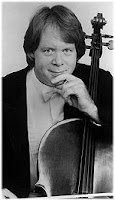
Certainly. It's my favourite subject. I think when people hear string playing and they like it, they're moved by it, it's because the string player has a sense of making the string instrument sound and speak and sing like a singer. So there are aspects of singing and speaking that are things we should try to copy and emulate.
...I sense those things and the connections of a good singer to playing a string instrument in a vocal way.
The variety of consonants in language, and the variety of colour of vowels - from the difference in vowels in French, German, Italian, they're just so many colours. The beginning of a breath should sound different than the end of a breath because if it sounds the same it's not a living breathing, alive animal. Sometimes that's extended so a string player is bound to just hold a note and its kind of an abstraction. And vibrato is a natural function of singing, so sometimes you vibrate on a string instrument very fast like a soprano, or sometimes very slowly like a bass singer. Of course when you vibrate very slowly and you're playing in the high register, it just sounds like a very fat over-the-top Wagnerian soprano who should've stopped singing twenty years ago. Which is of course funny. We all think of that as funny. So I can make people laugh by demonstrating (and he does that here, singing… "ooohhh") kind of vibrato. But it's appropriate in certain very low notes, because that's what happens with the bass singer down in the very deep register, where it vibrate much more slowly.
So there's breath, there's colour, there's articulation, and there's rhythm. The notation of music is divided mathematically by twos and threes. But there's a lot in between a two and a three. There's a lot in between that. And of course, there is in language and speech and poetry, there's sense that we can alter, with an educated guess, a classical rhythmic function much like in the La Mer (which was being rehearsed next door, and he demonstrates with notes from more vibrant to languid styles rhythm).

No comments:
Post a Comment